Faith
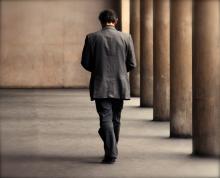
I have a confession.
(That's rich, right? A minister confessing.)
I have a hard time telling people I'm a minister. Yes, really. I actually tend to handle it this way:
Person: “So, what do you do for a living?”
Me: “I'm a minister... (appropriate pause)... but not the kind you just pictured in your head.”
Sad, I know.
Honestly though, it's worse than that. I'm even very resistant to calling myself a “Christian.” And I'm not even close to the only Christian who feels that way! It's so bad that I have this very conversation with people all the time. There seems to be some kind of “Believer-like-me Radar” which tells people it's safe to talk to me about not liking the“C” word — CHRISTIANITY.

 The response to this series of articles has been pretty overwhelming, and generally, very positive. For the handful of folks who label me an apostate, atheist, anti-Christian or what have you for stepping on some rhetorical toes, it’s fine if you feel the need to cast stones. But do bear in mind that, when you do, you are living into a stereotype of Christians as knee-jerk reactionary, judgmental people. Something to consider.
The response to this series of articles has been pretty overwhelming, and generally, very positive. For the handful of folks who label me an apostate, atheist, anti-Christian or what have you for stepping on some rhetorical toes, it’s fine if you feel the need to cast stones. But do bear in mind that, when you do, you are living into a stereotype of Christians as knee-jerk reactionary, judgmental people. Something to consider.
And for the hundreds who have written with thanks for helping them feel their pain, alienation, confusion or resistance is heard and understood, thank you.
In that spirit, I have compiled a third (and most likely, final) list of Cliches to avoid because, frankly, there were still so many worth noting that have yet to be addressed. Thanks to those who have submitted suggestions for additional lists. And because I’ve had some emails and comments asking for more clarity on what to do or say instead of leaning on these cliches, I’ll offer a closing piece for this series tomorrow about what I’d suggest Christians focus on instead of well-worn rhetorical scripts.
Enough prologue. Here are the final nine cliches to strike from the Christian lexicon if we’re interested in reaching people on a deeper, more personal level.
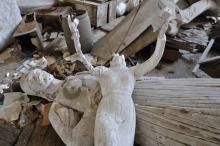
Good and gracious God,
Today, like the rest of the world,
when I woke I wrapped myself in myths.
They are comfortable and warming in what can seem like such a cold world.
Yes, they are old and worn but they are familiar
and even the most fashion forward find comfort in this thread-worn garb.
They tell me that while it may not be fair
that 1,600 children die from hunger everyday,
I can do nothing about it.
They silence my own judgment of myself
when I put a quarter in the cup of a homeless man
as I walk on by the lack in his life
to live into the abundance of mine....
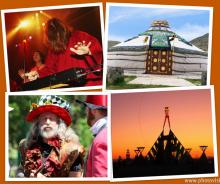
Last year, Phil Wyman, pastor of The Gathering church in Salem, Mass., trekked across the country with five adventurous friends to Burning Man — a week-long event described by its attendees as "an experiment in community, art, radical self-expression, and radical self-reliance" in the Black Rock desert of Nevada.
At the 2011 Burning Man, Wyman and his merry band of "crazy friends" built an art installation called "The Pillars of the Saints" — three meditation towers constructed of wood in the desert, asked people to sit on top of them, listen for a voice (presumably of the Holy), and write what they heard on the walls of the pillars.
This year, Wyman (who you might recognize from photos at the Wild Goose Festival last month where he played the "Holy Fool" in a Sunday morning worship service), has invited more than 15 friends to join him in the Nevada desert at the end of August for Burning Man 2012 where the group plans to build another art installation — this one even more ambitious and whimsical than the last.
Wyman & Co., have christened it "Theophony: The Mighty Interactive Faux Theremin." It involves an enormous, specially-built theremin placed at the center of a 32-foot canvas-and-wood yurt, with walls comprised of a series of 22 four-by-eight-foot murals with themes reflecting the "success and failures of spiritual pursuit."
"The particpant will feel a sense of dissonance while trying to 'play' the theremin," in tune with the chants and ambient music piped through the yurt, Wyman explains. The idea of Theophony is "to illustrate that spiritual pursuit is a discipline, but that even the imperfect attempt is both holy and fun."

Sister Kathy Long turned toward my 13-year-old daughter and asked one question: “What will you tell your friends about spending this month in Mexico?”
In a public park in Cuernavaca, Mexico, we sat on a concrete bench next to six women who chatted and stitched embroidery patterns with brightly colored thread.
I glanced toward the sewing group, realizing that Maya would have rolled her eyes if I had asked her that same question. An intrusive query from a mother seemed compelling coming from a Catholic nun who worked in Mexico, promoted justice amid poverty, and even spent three months in jail for protesting the military training of Latin American leaders in the U.S.
“I will tell them that rich people and poor people are all people in the end,” Maya responded. “If you have three cars and two houses, you are a person just like someone whose house is made of cardboard or metal.”

We elect a president every four years, but perhaps we also elect a high priest. Ever since George Washington spontaneously added “so help me God” to his inaugural oath, Americans have expected their presidents to believe in, worship and publicly invoke God....
History suggests, however, that piety and presidential performance don’t always match. Some of America’s most religious presidents have been its most brutal. And two of its greatest presidents wouldn’t even be considered Christians today, scholars say.
Consider Abraham Lincoln, who is widely acknowledged as one of the nation’s three greatest presidents, along with Washington and Franklin Delano Roosevelt. But Lincoln, who never joined a church, was not a Christian, says Niels C. Nielsen, author of God in the Obama Era.
“Lincoln believed in an active God, he believed in providence. But if you asked Lincoln if he believed in the deity of Jesus, he would have said no,” Nielsen says.
Or look at Roosevelt, who is virtually a national saint. With his perpetual grin and a cigarette holder perched jauntily in his mouth, he guided the nation through the Great Depression and World War II. His legacy is built on his New Deal, an array of programs that protected the poor and elderly from the abuses of unrestrained capitalism.
But Roosevelt was no saint in his personal life. He rarely talked publicly about his Episcopal faith, preferred golf over church (before he was stricken by polio), and likely cheated on his wife, scholars say.
Read Blake's report — which also examines the faith of Lyndon Johnson, Richard Nixon, Andrew Jackson, Thomas Jefferson and Barack Obama — HERE.
A new survey of medical patients found that prayer — with their physician — is for many an important part of the treatment process.
According to American Medical News:
About two-thirds of patients believe doctors should know about their spiritual beliefs, said a survey of nearly 500 adults from Florida, North Carolina and Vermont in the January 2003 Journal of General Internal Medicine.
One in five patients likes the idea of praying with the doctor during a routine office visit, while nearly 30 percent want to do so during a hospital stay, the study found. Half of patients would want to pray with the doctor in a near-death scenario.
About 75 percent of physicians say patients sometimes or often mention spiritual issues such as God, prayer, meditation or the Bible, said an April 9, 2007, article in Archives of Internal Medicine.
The question of whether it is appropriate for doctors to pray with patients was addressed in late May at a three-day conference organized by the University of Chicago Program on Medicine and Religion.
G. Richard Holt, MD, MPH, a recently retired otolaryngologist, gave a presentation reviewing his perspective as a head-and-neck surgeon.
During his 40-year career, Dr. Holt received about one or two prayer requests a month. He made it his practice to remain silent while the patient, a family member or religious leader prayed aloud. But Dr. Holt drew the line at initiating or leading prayer.
Read the article in its entirely HERE.
LOS ANGELES — Mention the word “exorcism” to most people, and you get descriptions of levitating bodies, spinning heads, oozing green bile and hissing serpentine tongues. But don’t expect to see these eye-popping visual effects in this summer’s stage version of The Exorcist at the Geffen Playhouse in Los Angeles.
 Instead, the production will have “minimal” special effects, according to playwright John Pielmeier, who adapted William Peter Blatty’s best-selling 1971 novel for the stage.
Instead, the production will have “minimal” special effects, according to playwright John Pielmeier, who adapted William Peter Blatty’s best-selling 1971 novel for the stage.
"I didn’t look at the movie when I was doing this adaptation. It’s all the book,” he said.
Pielmeier says that his version needs no spinning heads or green bile. Instead, there will be a simple set with a minimal cast. And rather than revolve around a young girl’s demonic possession, the story will focus upon a series of clever debates between the demon and the priests.

HUNTSVILLE, Ala. — When it comes time for family study hour at Chad and Charlotte Tate's home in Huntsville, Ala., Evan, 18 months, is quick to grab her Bible and climb onto her seat at the table.
As Jehovah's Witnesses, the Tates believe it's never too early to help children begin learning the Bible.
"That's one of the things we really like about Jehovah's Witnesses," said Chad Tate, smiling as he watched his son, Tucker, 12, help boost his sister onto the table's bench. "We worship together and we study together as a family."
The small size of Kingdom Hall congregations, which are kept to around 100 members, emphasis on witnessing, and lack of paid clergy have helped Jehovah's Witnesses become one of the fastest growing faiths in the world.
Jehovah's Witnesses now have more than 1.1 million U.S. members and are one of the country's fastest-growing denominations, with personal evangelism required of all members.

SEATTLE — In 1962, when my younger brother was just four years old, this city perched on the nation's northwest rim held a World's Fair that imagined a glistening future.
Grounded in a vision of science and technology, the Century 21 Exposition foresaw a steady economic expansion and an orderly modernity that would continue 1950s prosperity and stability far into the future.
They got the science and technology right. Seattle is now a world hub for software development and Internet commerce, as well as for the caffeine and jeans-clad lifestyle that fuel young techs.
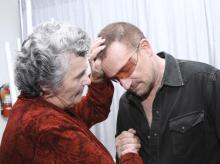
Editor's Note: Sister Joan Chittister, the Benedictine Catholic sister, author and social justice stalwart, delivered the Baccalaureate address at Stanford University a few weeks ago. Below is the text of her address.
Bertolt Brecht, German dramatist and poet wrote: "There are many elements to a campaign. Leadership is number one. Everything else is number two."
And Walter Lippmann said: "The final test of a leader is someone who leaves behind themselves – in others – the conviction and the will to carry on."
But how do we know what it means to really be a leader and how do we know who should do it?
There are some clues to those answers in folk literature, I think. The first story is about two boats that meet head on in a shipping channel at night.
As boats are wont to do in the dark, boat number 1 flashed boat number 2: "We are on a collision course. Turn your boat 10 degrees north."
Boat 2 signaled back: "Yes, we are on a collision course. Turn your boat 10 degrees south."
Boat 1 signaled again: "I am an admiral in her majesty's navy; I am telling you to turn your boat 10 degrees north."
Boat 2 flashed back immediately: "And I am a seaman 2nd class. And I am telling you to turn your boat 10 degrees south."
By this time, the admiral was furious. He flashed back: "I repeat! I am an admiral in her majesty's navy and I am commanding you to turn your boat 10 degrees north. I am in a battleship!"
And the second boat returned a signal that said: "And I am commanding you to turn your boat 10 degrees south. I am in a lighthouse."
Point: Rank, titles and positions are no substitute for leadership.
Our friends at #OccupyTheology caught up with Sojourners CEO Jim Wallis, Brian McLaren, Sojourners' Director of Mobilizing Lisa Sharon Harper and others at the Wild Goose Festival to talk about the Occupy movement, faith, politics and culture in a series of engaging videos.
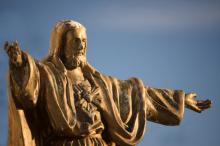
It’s such an easy thing to do,
To overshoot and lose touch with You;
Surrounded by everyday anxieties,
Add to them that you’re not too sensible to me,
And then you get me giving my all,
And then some,
Stretching and hoping,
Reaching and crying out for more of you
In my everyday moments.
I think that all simply misses the point.
You are present in my flesh and blood,
My soul but my pumping heart,
My thinking brain,
My biking legs and lifting arms.
I must believe you are more present
Than I know you to be....

The 2012 Wild Goose Festival East wrapped up just under a week ago and I am still trying to process my experience there. As I tweeted as I drove away from the fest, I left feeling exhausted, hopeful, and blessed – that strange combination that reflected the emotional impact of my time there. And it was a truly blessed time.
I was honored with the opportunity to speak on The Hunger Games and the Gospel as well as do a Q&A on everyday justice issues at the Likewise tent. I also was able to join Brett Webb-Mitchell on a panel discussion about living with disabilities in religious communities.
But beyond those conversations I was able to help initiate, I also found a generous and safe space to connect with friends, wrestle with difficult questions, and dream of a better world. Such spaces are so rare in my life these days, that finding such at Wild Goose was a precious gift.
There are, of course, the expected complaints about the festival. It was brutally hot (and that is coming from a Texan). I never ceased to be sticky, sweaty, and stinky and there were bugs everywhere. Camping in a field where every action (and parenting attempt) is on constant display is stressful and uncomfortable. And, as with many religious gatherings, there could have been greater diversity.
For the first hour I was there as I nearly passed out trying to set up a tent in the sweltering heat, I was in a panic mode wondering why I was stupid enough to subject myself to the discomfort and imperfection of it all again this year. Yet as I entered into the experience of being a part of this crazy wonderful gathering, those issues (although ever-present) faded in significance as I found myself fitting into a place where I felt I belonged.
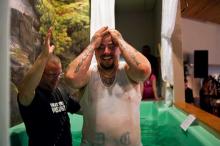
Two years ago, Chris Simpson led a white pride march.
Six months ago, he abandoned the white supremacy movement.
On April 15, he was baptized.
Five days later, Simpson sat in the waiting room of a skin and vein clinic, waiting to start the long and painful process of having his tattoos, most replete with Nazi or white pride iconography, removed.
"Hate will blind you to so many things. It will stop you from having so many things," Simpson said. "It consumes you."

I lost my joy. I suspect there are a few of you who feel the same way. Not that you aren't happy, but there is this deep place of celebratory joy which you once knew that really doesn't come around much anymore.
There was a time when I was a pretty joyful guy. Not “blind to the world's problems” kind of joyful, just “blessed to be blessed in the midst of this mess” kind of joyful. Lately though, I've found joy to be an increasingly difficult thing to come by.
The thing is, I have every reason to be joyful. I'm lucky enough to be married to an amazing woman – truly amazing. I couldn't be prouder of my kids who, in an age of “be different just like us” are very much their own kind of different simply because they aren't afraid of being themselves. My personal interests, like my blog, just keep getting better. I have some of the best friends in the world. Yet, I'm not the generally joyful person I once was.
It's a dull malaise that I just can't quite shake. I don't like it. Not one bit.
Recently though, I've been catching little glimpses of my joy making cameo appearances in the storyline of my life. I like it. A lot.
The question is, why now? Why not back then?
We have listened to many of the modern-day prophets of our times. They have pointed the way toward justice and restoration. We have prayed together and moved our bodies together and exercised the discipline of silence together in order to get a glimpse at God’s kind of justice. In more ways than one, we have had a mountaintop experience, but most of us don’t live on mountaintops. We live back down in the valleys, in cities and town, in the commotion of life and work and love.
And so, it is necessary that we take time while on the mountaintop to reflect on all that God has given us in this special place. To imagine the implications of these truths, these questions, these stories on how we will live our lives.

Colorado Springs really must have angered God.
I’m not sure what the city's residents have done, but He has to have a reason for burning up homes and possessions. One thing we know: God sends messages through natural disasters to certain groups who defy him and peddle evil. How else could we explain what’s happening?
Mark 4 tells us that Jesus controls the wind. And it is the wind, in large part, that has caused the fire to spread. Perhaps we should heed the warning of Jesus in Luke 13 and repent or else face the reality of perishing like them.
Is it possible that groups such as Compassion International and Bibles for the World have secretly condoned certain sins that will, in the end, keep people out of the kingdom of God? What message is God sending to groups like HCJB Global and Biblica?
This fire seems to be warning to them, and everyone to repent. They need to step up and reaffirm the Evangelical tradition. They must turn back from distorting whatever it is they have distorted about God’s character.
Does this sound ridiculous?

On Thursday, the Supreme Court ruled that the federal government does hold the constitutional power to mandate that most American's purchase health insurance or pay a penalty. This power is maintained in Congress’s ability to levy taxes.
The justices also ruled that the federal government does hold the constitutional power to expand Medicaid, making more people eligible to receive the benefit, but, like the original Medicaid law of 1965, states can opt out of the expansion if they so choose.
What does this mean? And what does this mean for Jesus followers?

Where there is no vision, the people perish. ~ Proverbs 29:18
Thursday’s Supreme Court ruling on the constitutionality of the Affordable Care Act was remarkable in a number of ways. The vast majority of articles, blogs, and analyses focus on the political ramifications of the decision.
Is this a win for the Obama administration or fuel for the Romney campaign? Pundits have looked at nearly every political angle, from the upcoming presidential election to its effects on local politics.
While I appreciate the political analysis and the importance of political processes to the wellbeing of the United States, I believe that a majority of coverage has missed one of the most remarkable points of the ACA: It changes the vision of our national community.